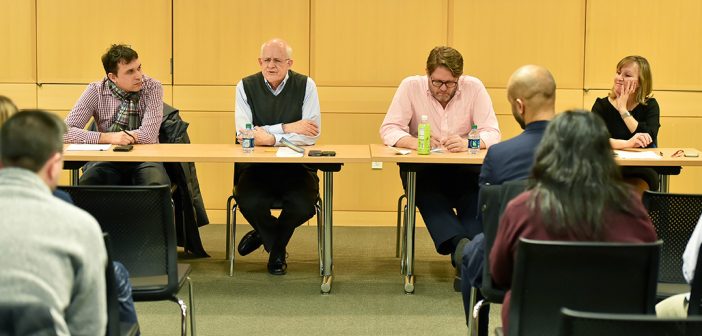The world is changing rapidly. Business needs to change too.
That was the message of Business with Purpose, a panel discussion held Wednesday, Feb. 13, at Fordham’s Lincoln Center campus.
“Everyone says we need to maximize shareholder value, and that apparently means today. But that’s an ephemeral goal. If you actually thought about the longer-term shareholder value, you have to take into account the environment,” said Paul Johnson, senior advisor at financial services consultant Harbor Peak, LLC, and adjunct professor at the Gabelli School of Business.
“These are shadow liabilities that are unrecognized from an accounting perspective, but they are going to come home to roost.”
Johnson was joined by the Gabelli School’s David Gautschi, Ph.D., the Joseph Keating, S.J., Professor of Marketing; Michael Pirson, Ph.D., associate professor of management systems; and Julita Haber, Ph.D., clinical assistant professor of communications and media management.
The discussion, which was moderated by Sertan Kabadayi, Ph.D., professor of marketing and chair of the marketing area at Gabelli School of Business, was sponsored by the graduate student club Fordham Net Impact.
A Critique of Short Term Thinking
Johnson said the term “long-term” needs to be reintroduced into discussions involving business.
Facebook exemplifies how not to do things, he said, as it puts too much emphasis on growth at any cost, without any consideration for users’ concerns about data collection, privacy, and disinformation.
“You no longer have any customer that would take a bullet for the business. The U.S. is looking at whether or not [Facebook] should be regulated, and no user is going to stand up and say ‘Hold on a second, this is really precious to me,’” he said.
Gautschi, who is also dean emeritus of the Gabelli graduate school, noted that the business world got a black eye in 2007 when the financial markets took a nose dive. This was not new though; in 2001, companies such as Enron, Parmalot, and Global Crossing were found to be operating in unethical, and in some cases, criminal ways.
“The fundamental purpose of business is to generate value and to distribute it. One of the problems that we have is we have a lot of things that are of value. Unfortunately, they’re of negative value, Gautschi said, as he detailed nearly a century of shady behavior in the business community.
“They’re called negative externalities, and they have just been ignored. They need to be brought into the calculus of decision makers within business.”
We Need Problem Solvers
Pirson said it doesn’t help that Americans subscribe to the belief that says we need someone like Elon Musk or Steve Jobs to save us.
“We need a lot of problem solvers, and whether they’re leaders or not doesn’t really matter to me,” he said.
“We’re all on this planet, we all need to problem solve wherever we are. It just matters what kind of problems we want to solve.”
Panelists diverged on how to address short-sightedness. Pirson noted that psychological research shows that humans are innately terrible when it comes to predicting the future.
“It’s easier to actually focus on the current problems and solve them, and see what develops. Nobody predicted the internet. Nobody predicted that Trump was going to win,” he said.
“So, I don’t know if we’re going to do ourselves service by saying we’re going to be long-term problem solvers of some sort. Maybe those long-term problems won’t even exist because we won’t exist.”
Gautschi, who spoke at length about the ways that California utility Pacific Gas and Electric failed to adequately plan for challenges such as climate change, pushed back.
“I will not disagree that beings are limited in their abilities to think long term, but damnit we’ve got to start doing this,” he said.
“The trick for business people, in particular, is to figure out how to adapt.”
To Minimize Blind Spots, Embrace Diversity
One way to adapt? Embrace diversity, said Johnson. If you gather together the broadest possible group of people to give you input, you minimize the number of blind spots you’ll have. Then, you need to create psychological safety where anyone can propose even the craziest ideas without fear of retribution, he said.
“You give me a group of diverse people, average capabilities, and I will crush any group of experts on the planet in any topic, as long as we have some sort of domain expertise,” he said.
Whereas Gautschi, Johnson, and Pirson addressed business from an institutional perspective, Haber, who was the first person to teach a class where students can ride bikes, said it’s important to consider the individual as well. Three-quarters of Americans’ health problems can be traced back to stress, she said. We spend 50 percent of our time in front of a screen, and the average person touches their smartphone 2,600 times a day.
“I see it with my students. What a difference over the years. I give them a five-minute break, and nobody talks,” said Haber, who had all the attendees stand up and stretch with her.
“Loneliness is the new smoking. We’re afraid to say it. ‘Oh my god, I’m not a loser, I can’t admit it.’ This is something that happens, but it happens undercover.”



